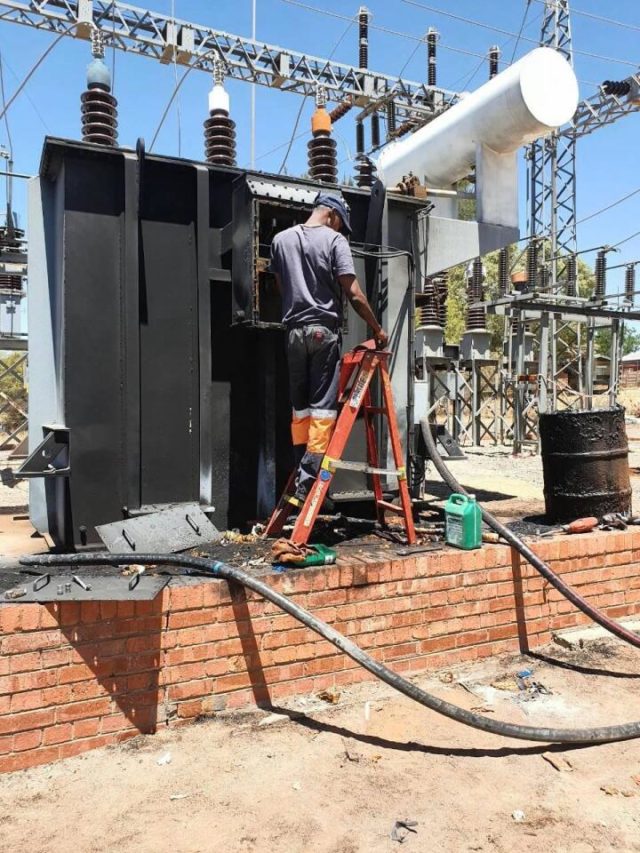“Due to extremely low levels at the Newton Reservoir, we have insufficient capacity to supply water to the high-pressure tower”
KIMBERLEY’S water woes continued yesterday after residents woke up to dry taps in the morning.
After several reports of broken pipes in various parts of the city, the municipality eventually acknowledged that there was a problem at the new pump station at Riverton on Monday morning already.
According to municipal spokesperson Sello Matsie, this resulted in water not being pumped from Riverton to the Newton Reservoir, causing the levels at the reservoir to drop drastically.
“Due to extremely low levels at the Newton Reservoir, we have insufficient capacity to supply water to the high-pressure tower,” Matsie said.
This meant that water could not be pumped from Newton to high-lying parts of the city and as a result, water to the entire city was cut yesterday morning.
By lunchtime yesterday, the levels at Newton had increased sufficiently to allow the water supply to be restored – but only for a short while until 2pm, when it was cut off again.
The municipality sent out a further warning that until the levels at Newton had increased sufficiently, the supply of water to the city would be restricted.
“Given the current situation, we will supply water to all areas only from the early hours of the morning until 2pm until further notice,” Matsie said in a notice to the media.
The restricted supply is expected to continue for a few days until the levels at Newton have stabilised again.
According to Matsie, the problem at Riverton was due to a damaged cable on one of the transformers that supplies electricity to the new pump station.
Work on the transformer continued yesterday and was expected to be completed by last night.
Irritated residents lashed out at the municipality, with many residents pointing out that broken water pipes in the city were not repaired and left to allow streams of clean drinking water to go to waste, while taps remained dry.
“There are broken water pipes throughout Kimberley and the municipality does nothing,” one resident said.
Meanwhile, the Sol Plaatje Municipality has also hinted at national restrictions being imposed by the Department of Water and Sanitation on users of the Vaal River system.
This followed an announcement by the Minister of Water and Sanitation, Lindiwe Sisulu, who called on every citizen to play their part to save water if the country is to avert water shedding.
“Water users must do whatever is necessary to ensure that water is conserved. There will not be a need for water shedding if water consumers adhere to calls to save water,” Sisulu said at a media briefing earlier this week.
The minister said that South Africa is a water-scarce country and unless citizens changed their behaviour to conserve water, the country is going to reach a point of water stress.
Sisulu’s briefing at Rand Water in Johannesburg came in the wake of the recent heatwave coupled with a shortage of rainfall. The situation has forced a number of municipalities to implement water restrictions already.
Sisulu said that climate change is a reality and that South Africa is one of the countries feeling the effects of the phenomenon.
While acknowledging that the situation is very serious, the minister stressed that there is no need to panic at this stage, provided that “all water users take collective action to save water”.
“I’ve been informed by my advisers that the earliest we can expect rain is December so we are in for a long dry season. Gauteng is not alone. There are other provinces like the Eastern Cape in particular and Limpopo, including large municipalities and numerous smaller towns, that have water restrictions in place.
“The reliable supply of water at an acceptable quantity and quality is essential for future development in South Africa. Global water stress surveys place us high on the list We have to really begin to disaster-proof South Africa and South Africa’s water security,” the minister said.
Rand Water CEO Sipho Mosai said that the country needs to reduce national consumption from 5 000 megalitres per day to the required 4 400 megalitres per day.
“If you have to water your garden, do it before sunrise or after sunset. Use water sparingly and use it for what it is intended. Reduce the amount of time you take to shower two minutes is more than enough. Every drop counts,” Mosai said.
Mosai stressed that water restrictions might be relaxed where they are in effect if the country goes back to an average water consumption of 4 400 megalitres per day.
Meanwhile, the department will in November unveil the National Water and Sanitation Masterplan, which includes measures to address water challenges across the country.
The plan intends to guide the water sector in investment planning for the development of water resources and the delivery of water and sanitation services towards 2030 and beyond.








